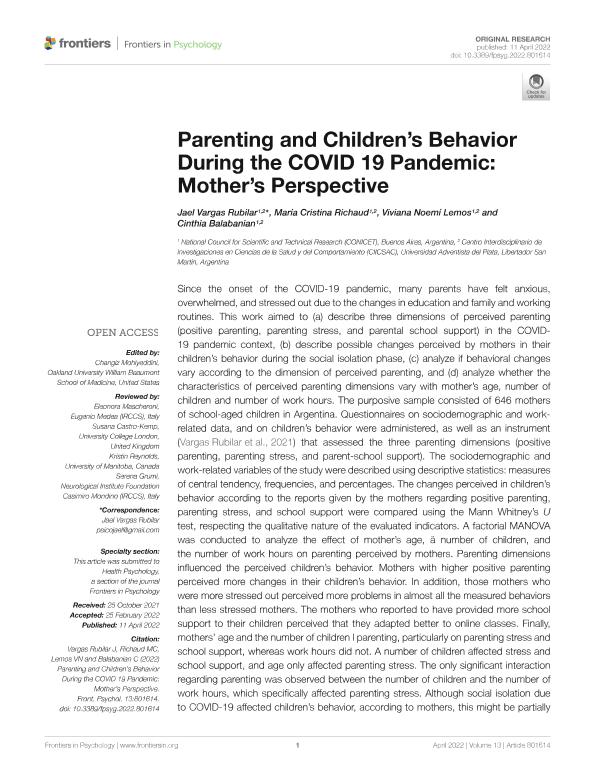Mostrar el registro sencillo del ítem
dc.contributor.author
Vargas Rubilar, Jael Alejandra

dc.contributor.author
Richaud, Maria Cristina

dc.contributor.author
Lemos, Viviana Noemí

dc.contributor.author
Balabanian, Cinthia

dc.date.available
2022-06-21T19:24:41Z
dc.date.issued
2022-04
dc.identifier.citation
Vargas Rubilar, Jael Alejandra; Richaud, Maria Cristina; Lemos, Viviana Noemí; Balabanian, Cinthia; Parenting and children´s behavior during the COVID 19 Pandemic: Mother´s perspective; Frontiers Media; Frontiers in Psychology; 13; 4-2022; 1-12
dc.identifier.uri
http://hdl.handle.net/11336/160109
dc.description.abstract
Since the onset of the COVID-19 pandemic, many parents have felt anxious, overwhelmed, and stressed out due to the changes in education and family and working routines. This work aimed to (a) describes three dimensions of perceived parenting (positive parenting, parenting stress, and parental school support) in the COVID-19 pandemic context, (b) describe possible changes perceived by mothers in their children’s behavior during the social isolation phase, (c) analyze if behavioral changes vary according to the dimension of perceived parenting, and (d) analyze whether the characteristics of perceived parenting dimensions vary with mother’s age, number of children and number of work hours. The purposive sample consisted of 646 mothers of school-aged children in Argentina. Questionnaires on sociodemographic and work-related data, and on children’s behavior were administered, as well as an instrument (Vargas Rubilar et al., 2021) that assessed the three parenting dimensions (positive parenting, parenting stress, and parent-school support). The sociodemographic and work-related variables of the study were described using descriptive statistics: measures of central tendency, frequencies, and percentages. The changes perceived in children’s behavior according to the reports given by the mothers regarding positive parenting, parenting stress, and school support were compared using the Mann Whitney’s U test, respecting the qualitative nature of the evaluated indicators. A factorial MANOVA was conducted to analyze the effect of mother’s age, ä number of children, and the number of work hours on parenting perceived by mothers. Parenting dimensions influenced the perceived children’s behavior. Mothers with higher positive parenting perceived more changes in their children’s behavior. In addition, those mothers who were more stressed out perceived more problems in almost all the measured behaviors than less stressed mothers. The mothers who reported to have provided more school support to their children perceived that they adapted better to online classes. Finally, mothers’ age and the number of children I parenting, particularly on parenting stress and school support, whereas work hours did not. A number of children affected stress and school support, and age only affected parenting stress. The only significant interaction regarding parenting was observed between the number of children and the number of work hours, which specifically affected parenting stress. Although social isolation due to COVID-19 affected children’s behavior, according to mothers, this might be partially linked to the number of children, mothers’ age, and the mothers’ parenting style. These initial findings may allow the identification of some protective factors and some risk factors of parenting in the Argentine context of a pandemic, and the design of preventive psychoeducational interventions to optimize the psychological wellbeing of families.
dc.format
application/pdf
dc.language.iso
eng
dc.publisher
Frontiers Media

dc.rights
info:eu-repo/semantics/openAccess
dc.rights.uri
https://creativecommons.org/licenses/by/2.5/ar/
dc.subject
CHILDREN´S BEHAVIOR
dc.subject
MOTHERS
dc.subject
PANDEMIC
dc.subject
PARENTING
dc.subject
STRESS
dc.subject
TELEWORK
dc.subject
COVID-19
dc.subject.classification
Otras Psicología

dc.subject.classification
Psicología

dc.subject.classification
CIENCIAS SOCIALES

dc.title
Parenting and children´s behavior during the COVID 19 Pandemic: Mother´s perspective
dc.type
info:eu-repo/semantics/article
dc.type
info:ar-repo/semantics/artículo
dc.type
info:eu-repo/semantics/publishedVersion
dc.date.updated
2022-06-21T18:00:04Z
dc.identifier.eissn
1664-1078
dc.journal.volume
13
dc.journal.pagination
1-12
dc.journal.pais
Suiza

dc.journal.ciudad
Lausanne
dc.description.fil
Fil: Vargas Rubilar, Jael Alejandra. Consejo Nacional de Investigaciones Científicas y Técnicas; Argentina. Universidad Adventista del Plata. Secretaría de Ciencia y Técnica. Centro Interdisciplinario de Investigaciones en Ciencias de la Salud y del Comportamiento; Argentina
dc.description.fil
Fil: Richaud, Maria Cristina. Consejo Nacional de Investigaciones Científicas y Técnicas; Argentina. Universidad Adventista del Plata. Secretaría de Ciencia y Técnica. Centro Interdisciplinario de Investigaciones en Ciencias de la Salud y del Comportamiento; Argentina
dc.description.fil
Fil: Lemos, Viviana Noemí. Consejo Nacional de Investigaciones Científicas y Técnicas; Argentina. Universidad Adventista del Plata. Secretaría de Ciencia y Técnica. Centro Interdisciplinario de Investigaciones en Ciencias de la Salud y del Comportamiento; Argentina
dc.description.fil
Fil: Balabanian, Cinthia. Consejo Nacional de Investigaciones Científicas y Técnicas; Argentina. Universidad Adventista del Plata. Secretaría de Ciencia y Técnica. Centro Interdisciplinario de Investigaciones en Ciencias de la Salud y del Comportamiento; Argentina
dc.journal.title
Frontiers in Psychology
dc.relation.alternativeid
info:eu-repo/semantics/altIdentifier/url/https://www.frontiersin.org/articles/10.3389/fpsyg.2022.801614/full
dc.relation.alternativeid
info:eu-repo/semantics/altIdentifier/doi/http://dx.doi.org/10.3389/fpsyg.2022.801614
Archivos asociados
